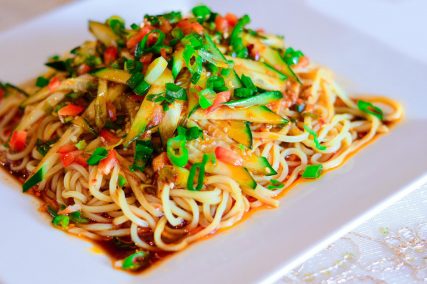After being detained in China, one LA resident began a Uyghur restaurant to educate through food
ALHAMBRA, Calif. (RNS) — Bright, young and ambitious, Bugra Arkin was similar to many other graduate students at University of Southern California. Arkin’s Uyghur heritage was little more than a footnote at a polyglot campus in one of America’s most multicultural cities.
Yet, when he visited Beijing prior to his graduation in 2017 as part of a school project, his ethnicity brought him undue attention. At 1 a.m., a knock came at his door, and he was questioned for hours by the police — an ordeal that shocked others on the school trip.
Thinking the authorities were no longer interested in him, he returned to his hometown of Urumqi, the capital of Xinjiang province, weeks later. He was again accosted and, this time, arrested and held for two days. He was not accused of any crime on either occasion but told the harsh treatment was due to his time abroad.
“While I was in prison, they told me they had already rounded up some 280,000 Uyghurs,” a figure Arkin said he found astonishing. How could they hold so many people?
Unwittingly the business student had nearly been caught up in the largest detention of an ethnic or religious minority since World War II. Today estimates suggest there are over a million Uyghurs being held in hundreds of camps across China. Thousands of Uyghurs have been sent to work in forced labor conditions. The Chinese government denies the existence of what the U.S. government has labeled a “genocide” and says such camps are for educational purposes.

Bugra Arkin, founder and owner of Dolan’s Uyghur Cuisine in Alhambra, California. RNS photo by Joseph Hammond
After his release, Arkin made quick plans to return to the United States. A few months after Arkin fled China, his father was detained.
“I have no way of knowing what happened to him or even if he is alive. We have received no documentation regarding him,” Arkin said, adding that some cousins and uncles are in detention as well.
Back in the safety of Los Angeles, Arkin felt he personally had to do something to bring attention to the plight of his people and their unique culture. The sort of business career pursued by many of his fellow students just no longer made sense. Instead, he sought to open a restaurant to help bring an embassy of Uyghur culture to Los Angeles. With that, Dolan’s Uyghur Cuisine in Alhambra, California, was born.
RELATED: As genocide designation becomes a political football, Uyghur activists push for action
“I am very proud of our food and believe our food can be a success in Los Angeles like many other cultures who have introduced their food here before,” he said.
Lamb and beef feature heavily on the menu as they do in many Central Asian cuisines. Somewhat more specific to Uyghur cuisine are a variety of chicken, fish and vegetarian dishes. Some dishes are simple, like a salad made of cured garlic and cucumber. Others are more elaborate: An entire roasted lamb can be ordered in advance for $468.
Reproductions of the painting “Uyghur Muqam” by Ghazi Ahmet can be found on the walls of Uyghur restaurants around the world, and Dolan’s is no exception. The painting commemorates the core melodies and rhythms that guide improvised Uyghur dance and music — an art form that was recognized by UNESCO in 2005, the menu tells diners. The menu also includes large glossy photos of the restaurant’s dishes for those unfamiliar with the cuisine on offer.

Cold Noodles are one of several appetizers available at the restaurant. Image courtesy of Bugra Arkin
Popular dishes include manta, a sort of dumpling filled with beef or pumpkin. Another dish with Uyghur roots is laghman, a hearty dish of thick noodles with spices, vegetables and meats — now considered part of national cuisines as far afield as the Crimean Tatars.
“We had great support from our Muslim brothers in Pasadena and San Gabriel Valley more generally. For a lot of Muslims, we have introduced them to a new taste.” Cultural and linguistic similarities between Uyghurs and other Turkic groups in Central Asia also mean the restaurant is well patronized by members of those groups in the Los Angeles area.
In 2019, the restaurant offered special packages for iftar, the meal that breaks the daily fast during Ramadan. COVID-19 restrictions have made such plans untenable since.
Arkin believes the restaurant is one small act of resistance against efforts to erase Uyghur culture in China — especially at a time when even Uyghurs who live outside the camps are subject to harsh treatments, which can include being force-fed pork or made to host an observer from the ethnic Han Chinese majority.
A midweek visit by Religion News Service found the restaurant closed for indoor dining but providing brisk service with food delivery drivers. A larger mural depicting Uyghur culture sits above an outside dining area with the ready-made social-media hashtag #GoogleUyghurs in one corner. Arkin also sells a T-shirt with the hashtag and has hosted events to highlight the plight of his people. The restaurant has also worked with nongovernmental organizations and local universities to further bring attention to the issues.
RELATED: After advocating for his release, Uighur woman hears from father via Chinese media
The San Gabriel Valley, a region to the east of Los Angeles, is home to large concentrations of Chinese restaurants. One search of Grubhub, a food delivery service, found 83 Chinese restaurants available to the 84,000 residents of Alhambra. Arkin believes that as much as 70% of his business at present comes from members of the Chinese diaspora, but he is keen to build bridges for all members of the local community. Indeed, traditionally Uyghur food is quite commonly found in China’s major cities and consumed by members of all religions. The menu includes a few dishes that draw on the cuisine of other regions of China.
“I was worried people would attack me when I opened but I was surprised to see there are so many people opposed to the Chinese Communist Party here in this area. We have many YouTubers and others who come here, and I think that’s an important way to build awareness.”







